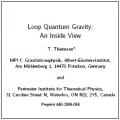
New Paths Towards Quantum Gravity
by B. Booss-Bavnbek, G. Esposito, M. Lesch
Publisher: Springer 2010
ISBN/ASIN: 3642118968
ISBN-13: 9783642118968
Number of pages: 380
Description:
The division of the book in two parts reflects the duality between the physical vision and the mathematical construction. The former is represented by tutorial reviews on non-commutative geometry, on space-time discretization and renormalization and on gauge field path integrals. The latter one by lectures on cohomology, on stochastic geometry and on mathematical tools for the effective action in quantum gravity.
Download or read it online for free here:
Download link
(13MB, PDF)
Similar books
 An Elementary Introduction to Loop Quantum Gravity
An Elementary Introduction to Loop Quantum Gravityby Norbert Bodendorfer - arXiv
An introduction to loop quantum gravity is given, focussing on the fundamental aspects of the theory, different approaches to the dynamics, as well as possible future directions. It is structured in five lectures, including exercises.
(6575 views)
 The Spin Foam Approach to Quantum Gravity
The Spin Foam Approach to Quantum Gravityby Alejandro Perez - arXiv
This article reviews the present status of the spin foam approach to the quantization of gravity. Special attention is payed to the pedagogical presentation of the recently introduced new models for four dimensional quantum gravity.
(7585 views)
 Quantum Physics, Relativity, and Complex Spacetime
Quantum Physics, Relativity, and Complex Spacetimeby Gerald Kaiser - University of Massachusetts at Lowell
A new synthesis of the principles of quantum mechanics and Relativity is proposed in the context of complex differential geometry. The positivity of the energy implies that wave functions and fields can be extended to complex spacetime.
(14602 views)
 Loop Quantum Gravity
Loop Quantum Gravityby Thomas Thiemann - arXiv
This is a (relatively) non-technical summary of the status of the quantum dynamics in Loop Quantum Gravity (LQG). We explain in detail the historical evolution of the subject and why the results obtained so far are non-trivial.
(9948 views)